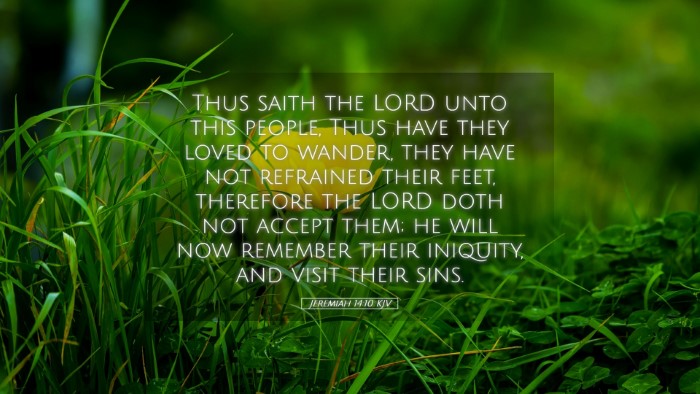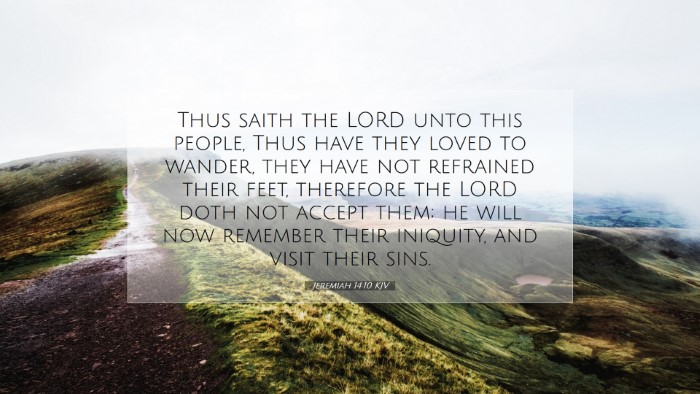Commentary on Jeremiah 14:10
Verse: "Thus saith the Lord unto this people, Thus have they loved to wander; they have not refrained their feet, therefore the Lord doth not accept them; he will now remember their iniquity, and visit their sins."
Contextual Background
This verse comes during a time of great distress for Judah, marked by drought and spiritual abandonment. The Lord speaks through Jeremiah, addressing the dire consequences of the people’s unfaithfulness. The nation was in a state of rebellion against God, who had shown them grace and guidance. Understanding the context helps clarify the significance of the message being delivered.
Insights from Commentaries
Matthew Henry's Commentary
Matthew Henry emphasizes the persistent rebellious nature of the people, noting that their love for wandering indicates a departure from divine guidance. He states, "They have loved to wander, to go astray from God and from his ways, and they have not refrained their feet," suggesting an intentional deviation from righteousness. Henry highlights that this spiritual wandering reflects a heart condition that desires anything but God.
He warns that God’s refusal to accept them is a direct consequence of their choices, elaborating that "the Lord doth not accept them" symbolizes a severing of their relationship with Him. This divine rejection serves to remind both the original audience and modern readers that unrepentance leads to estrangement from God.
Albert Barnes' Notes on the Whole Bible
Barnes takes a similarly grave view of the people’s situation, arguing that their actions have resulted in unavoidable divine judgment. He interprets the phrase, "he will now remember their iniquity, and visit their sins," as a vivid reflection of God’s justice. The concept of 'remembrance' here is crucial; it infers not just a recollection but an act of retribution. Barnes asserts that God's patience has been exhausted by continual disobedience: "God's justice will not remain silent forever."
Furthermore, Barnes underscores the inevitable outcome of persistent iniquity, where God’s impartiality in dealing with sin is made apparent. He elucidates that this visit is not merely punitive but serves as a wake-up call to a people in spiritual slumber, emphasizing the need for self-examination and repentance.
Adam Clarke's Commentary
Clarke provides a historical perspective, suggesting that the physical drought faced by Judah serves as a metaphorical dry spell in their spiritual lives. His comment about their love of wandering connects to a profound distrust in God's providence. He argues, "A soul that loves to wander from God will ultimately fall into desolation." This illustrates the consequences of abandoning divine relationships for worldly pursuits.
He indicates that God's response is one of disappointed affection: "The Lord doth not accept them," which signifies that God desires communion with His people. Clarke also draws attention to God's remembrance of iniquities, presenting it as an acknowledgment of unrepented sins. He urges readers to recognize that divine action is always motivated by justice coupled with a deep desire for repentance and restoration.
Theological Implications
Theologically, Jeremiah 14:10 serves as a poignant reminder of the importance of fidelity in the believer's journey. The love of wandering, as highlighted in the aforementioned commentaries, can be seen as a metaphor for sin and spiritual distraction that leads one away from God. This wandering has both personal and communal implications, reminding us that corporate sin can lead to widespread consequences.
Reflection on Repentance
This passage calls for serious reflection on the nature of true repentance. It beckons believers to assess their circumstances and identify any 'wandering' in their hearts. The reminder that God will visit iniquity calls for an understanding that divine justice operates not merely as punishment but serves the purpose of drawing the faithful back into the fold.
Conclusion
In concluding thoughts, Jeremiah 14:10 encapsulates the interplay between human agency and divine sovereignty. As the people of Judah faced the dire consequences of their rebellion, they were invited to remember the mercy of God that calls them back to repentance. For pastors, students, theologians, and scholars, this text is not only a historical account but also a timeless teaching on the necessity of remaining steadfast in faithfulness to God amid a world filled with distractions.


